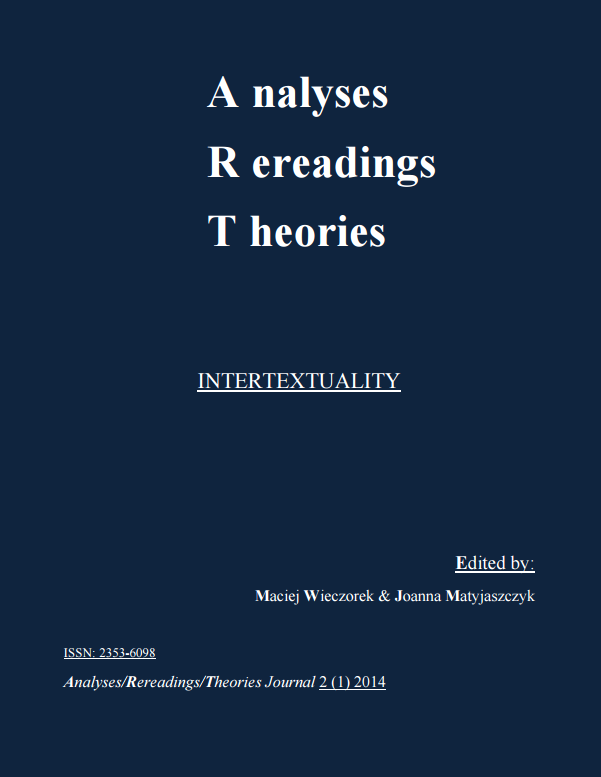Whodunit to Irene Adler? From “the Woman” to “the Dominatrix” – on the Transformation of the Heroine in the Adapting Process and Her Representation in the Sherlock Miniseries
DOI:
https://doi.org/10.18778/2353-6098.2.06Keywords:
Irene Adler, Sherlock Holmes, adaptation, appropriation, reinterpretation, transmedia fandom, fan fictionAbstract
One of the peculiar characteristics of the Sherlock Holmes fandom is that it has always had a tendency to blow innuendos in Arthur Conan Doyle’s stories out of proportion. One might argue that such is the case of Irene Adler, the most recognisable female character from the Sherlock Holmes canon. Although we are not given much information on her in the original story and she hardly speaks in her own voice, for the community of readers she has become the most significant woman that Sherlock Holmes had ever encountered. Thus, the creators who adapted her for the screen also treated the heroine of “A Scandal in Bohemia” symbolically, allowing themselves to freely portray her presence in their versions of the story. For certain reasons, Irene Adler has been interpreted in pop-culture differently at various times: as the woman who beat Holmes with her wit, the detective’s romantic interest, his nemesis or a femme fatale figure. This tendency seems to be pushed to the extreme recently and the adaptations of the heroine in question gravitate towards a sexually confident, overtly self-aware, as well as dominant (both sexually and mentally) rival to Holmes. The idea behind this paper is to investigate the transformation of Irene Adler’s character from the originally debatably scandalous adventuress to her modern portrayal as a dominatrix in the BBC miniseries, Sherlock. Hence, I will concentrate on this most recent take on the woman in the episode “A Scandal in Belgravia,” attempting to analyse in what ways the creators of the show go back to the roots and succeed in capturing the essence of Irene Adler’s figure, and conversely – in what measure does this adaptation epitomize the changes done to the character over the years of reinterpreting and diverting from its literary counterpart.
References
Doyle, Arthur Conan. “A Scandal in Bohemia.” The Penguin Complete Sherlock Holmes. Harmondsworth: Penguin, 1985. 161-175. Print.
Google Scholar
Dressed to Kill. Dir. Roy William Neill. Perf. Basil Rathbone, Nigel Bruce, Patricia Morison. Universal Pictures, 1946. Film.
Google Scholar
“Heroine.” Elementary. Dir. John Polson. Perf. Jonny Lee Miller, Lucy Liu, Natalie Dormer. CBS. 16 May. 2013. Television.
Google Scholar
Jeffries, Stuart. “‘There is a Clue Everybody’s Missed’: Sherlock Writer Steven Moffat Interviewed.” The Guardian. guardian.co.uk. 20 Jan 2012. Web. 15 Mar. 2013.
Google Scholar
Jenkins, Henry. “Transmedia Storytelling 101.” Confessions of an Aca-Fan: The Official Weblog of Henry Jenkins. henryjenkins.org. 22 Mar. 2007. Web. 15 Mar. 2013.
Google Scholar
Jenkins, Henry. “Transmedia 202: Further Reflections.” Confessions of an Aca-Fan: The Official Weblog of Henry Jenkins. henryjenkins.org. 1 Aug. 2011. Web. 15 Mar. 2013.
Google Scholar
Jones, Jane Clare. “Is Sherlock Sexist? Steven Moffat’s Wanton Women.” The Guardian. guardian.co.uk. 3 Jan. 2012. Web. 15 Mar. 2013.
Google Scholar
Klinger, Leslie S. The New Annotated Sherlock Holmes. New York, London: Norton, 2005. Print.
Google Scholar
Krumm, Pascale. “‘A Scandal In Bohemia’ And Sherlock Holmes's Ultimate Mystery Solved.” English Literature In Transition, 1880-1920 39.2 (1996): 193-203. Academic Search Complete. Web. 15 Mar. 2013.
Google Scholar
Polatynska, Joanna, and Catharina Polatynska. “A Few Words about Theatres in Warsaw or Where Sang Irene Adler.” diogenes-club.com. 2000. Web. 24 Mar. 2014.
Google Scholar
Redmond, Christopher. A Sherlock Holmes Handbook. Toronto: Dundurn, 2009. Print.
Google Scholar
“A Scandal in Belgravia.” Sherlock. Dir. Paul McGuigan. Perf. Benedict Cumberbatch, Martin Freeman, Lara Pulver. BBC Wales/Hartswood Films. BBC One. 1 Jan. 2012. Television.
Google Scholar
Sherlock Holmes. Dir. Guy Ritchie. Perf. Robert Downey Jr., Jude Law, Rachel McAdams. Warner Bros, 2009. Film.
Google Scholar
Sherlock Holmes: A Game of Shadows. Dir. Guy Ritchie. Perf. Robert Downey Jr., Jude Law, Rachel McAdams. Warner Bros, 2011. Film.
Google Scholar
Syme, Holger. “Steven Moffat, Sherlock, and Neo-Victorian Sexism.” dispositio. dispositio.net. 2 Jan. 2012. Web. 15 Mar. 2013.
Google Scholar
“Taming the Woman: Irene Adler and the Male Gaze.” 3chicGeeks. 3chicgeeks.com. 23 May 2013. Web. 19 Mar. 2014.
Google Scholar
“The Woman.” Elementary. Dir. Seith Mann. Perf. Jonny Lee Miller, Lucy Liu, Natalie Dormer. CBS. 16 May. 2013. Television.
Google Scholar
Vanacker, Sabine. “Sherlock’s Progress through History: Feminist Revisions of Holmes.” Sherlock Holmes and Conan Doyle: Multi-Media Afterlives. Eds. Sabine Vanacker, Catherine Wynne. Houndmills, Basingstoke: Palgrave Macmillan, 2012. 93-108. Print.
Google Scholar
DOI: https://doi.org/10.1057/9781137291561_7
Downloads
Published
How to Cite
Issue
Section
License

This work is licensed under a Creative Commons Attribution-NonCommercial-NoDerivatives 3.0 Unported License.









